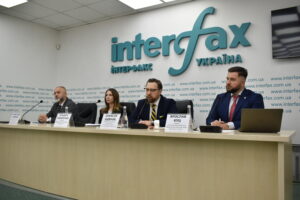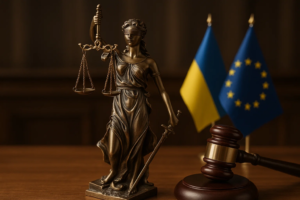
The creation of an Interdepartmental Coordination Commission (National Coordinator) to combat crime under the Cabinet of Ministers will eliminate the fragmentation of powers among authorities in this area and help bring the national system for combating organized crime closer to European standards.
This opinion was expressed to Interfax-Ukraine by Khristina Bilak, an employee of the Barristers law firm, commenting on the draft amendments to the law on the organizational and legal basis for combating organized crime registered in the Verkhovna Rada.
She noted that the relevant commission will become a permanent consultative and advisory body under the Cabinet of Ministers and will ensure the coordination of actions by state bodies involved in the fight against organized crime, strategic planning, threat assessment, monitoring, and control of the implementation of state policy in the field of combating organized crime, and will bring the national system of combating organized crime closer to European standards of management and coordination.
In particular, according to the draft law, the National Coordinator will develop comprehensive action plans based on defined priorities and summarize information on their implementation, completion, or reasons for non-implementation.
At the same time, the lawyer noted that, according to the government decree of September 27, 2022, until the creation of the national coordinator, his functions are entrusted to the Ministry of Internal Affairs.
The draft law was developed to fulfill Ukraine’s commitments in the field of European integration. The creation of a permanent national coordinator for combating organized crime is also one of the recommendations of the European Commission set out in the report on Ukraine’s progress within the framework of the 2023 European Union Enlargement Package.

The draft law proposed by the Ministry of Finance “On Amendments to the Tax Code of Ukraine Regarding the Registration of Single Tax Payers as Value Added Tax Payers,” which changes the system for sole proprietors by introducing VAT for them, eliminates the very philosophy of the simplified taxation system, according to Taras Onishchenko, partner at the law firm Barristers Commercial.
“The proposed changes effectively eliminate the very philosophy of the simplified taxation system, which was created to support and develop the middle class. The introduction of VAT for microbusinesses with a turnover of UAH 1 million looks like an attempt to solve budget problems at the expense of the least protected market participants. Although the Ministry of Finance refers to the requirements of the IMF and the need for European integration, the implementation of these changes without a significant increase in the registration threshold could lead to the disappearance of legal small businesses as a class,” he told the Interfax-Ukraine news agency.
Onishchenko noted that the only criterion for mandatory VAT registration is “an income threshold of UAH 1 million over the last 12 calendar months.”
“In practice, this means that any entrepreneur — whether a coffee shop owner, hairdresser, IT specialist, or salesperson in a local store — will be required to obtain VAT payer status if they exceed this limit. The only exception is for a narrow category of e-residents. Thus, the state plans to cover almost the entire spectrum of small businesses with VAT, from market trading to the provision of household services, which was previously the prerogative of the general taxation system,” he said.
The expert noted that “the government’s intentions are serious and clearly planned in terms of timing; in particular, in response to an appeal from the National Association of Lobbyists of Ukraine, the Ministry of Finance disclosed details of agreements with international partners.”
According to the Ministry of Finance, the introduction of VAT for “simplified taxpayers” is part of the implementation of the conditions of the new 48-month cooperation program with the International Monetary Fund (Extended Fund Facility – EFF), an agreement on which was reached at the expert level on November 26, 2025. This program provides access to $8.1 billion in financing.
The reform schedule provides that amendments to the Tax Code will be submitted to the Verkhovna Rada in January 2026, and from January 1, 2027, the requirement for mandatory VAT registration for all “simplified taxpayers” with a turnover of more than UAH 1 million will become mandatory.
At the same time, the lawyer notes that the Ministry of Finance expects the reform to have a fiscal effect of more than UAH 40 billion in additional budget revenues in the first year of its implementation.
At the same time, Onishchenko believes that this initiative carries much deeper risks that could offset the potential fiscal benefits.
“The most critical point is the threshold of UAH 1 million itself. In the current inflationary environment, this amount is equivalent to a turnover (not profit!) of UAH 83,000 per month. This is an indicator of a microbusiness, which is often run by one person or a family. Forcing such businesses to administer VAT is placing an excessive administrative burden on them,“ he explains.
The expert also predicts an increase in the shadow economy and a mass exodus of businesses into the ”shadow.”
“Entrepreneurs whose turnover fluctuates between UAH 1.5-2 million will be faced with a choice: either raise prices by 20% and hire an accountant, losing competitiveness, or split the business among relatives, or switch to cash payments ‘off the books’ so as not to artificially exceed the limit of UAH 1 million.
Meanwhile, large and medium-sized taxpayers who use simplified tax systems in their work will be able to simply increase their number and continue to use them,” he said.
Onishchenko also predicts that the introduction of tax changes will lead to higher inflation and more expensive goods and services for end consumers. He estimates that the cost of a haircut, shoe repair, or coffee will automatically increase by at least 20%, which will trigger a new round of inflation in the service sector, and these changes will also lead to increased corruption risks.
“It is also worth considering the problem of blocked tax invoices. While this is currently a headache for medium and large businesses, after the reform, thousands of small entrepreneurs may become hostages of the system. For small businesses, even a week-long stoppage due to bureaucratic obstacles can be fatal,” he stressed.
Onishchenko noted that “although the Ministry of Finance refers to the requirements of the IMF and the need for European integration, the implementation of these changes without a significant increase in the registration threshold could lead to the disappearance of legal small businesses as a class.”
“That is why it is critically important for the business community to join the discussion of this bill on the Ministry of Finance website while it is still in the consultation stage,” the expert emphasized.

The law allows women with medical and pharmaceutical education to be registered for military service without their personal presence, but there are no mechanisms for the forced conscription of such women from abroad, lawyers interviewed by the Interfax-Ukraine news agency explained.
“The obligation to register for military service does indeed exist. If a person is physically outside Ukraine, they must notify the territorial recruitment center at their place of registration, in particular by email, that they are temporarily abroad. However, there is no mechanism that would allow the state to forcibly return a citizen to fulfill this obligation. This also applies to those who are abroad under the temporary protection mechanism,” said Zoryana Skaletska, partner at Ario Law Firm and Minister of Health in 2019-2020.
She noted that in the context of military registration of women with medical or pharmaceutical education, “it is important to distinguish between the concepts of ‘compulsory’ and ‘automatic’ registration.”
“Compulsory always means restriction of freedom, and we do not have such mechanisms. However, automatic registration is indeed provided for. The Cabinet of Ministers’ resolution of July 30, 2025, allows such women to be registered for military service without their personal presence,” she said.
Skaletskaya explained that there are currently three mechanisms through which women with medical or pharmaceutical education can be entered into the Unified State Register of Conscripts, Military Service Obligators, and Reservists: through an educational institution, through a personal message, and through an employer.
“Thus, ‘automatic registration’ actually takes place through official notification of the educational institution or employer, but does not imply coercion or physical control by the state,” Skaletskaya noted.
She also emphasized that the law does not provide for separate liability specifically for women with medical or pharmaceutical education who have not registered for military service, since there are now general rules on violations of the law on military duty and military service, which provide for a fine of 850 to 1,700 hryvnia.
“Theoretically, this article can also be applied to women who have the relevant education but have not applied to the TCC and SP, especially if they are not employed and received their diploma many years ago. However, in practice, the application of this norm is still limited,” she noted.
Skaletskaya pointed out that the TCC and SP will only be able to automatically identify such persons when the Unified State Register of Conscripts, Military Service Obligators, and Reservists has technical access to the Ministry of Education’s diploma database.
“Currently, such interaction between the registers has not been introduced, so we do not see active prosecution of female medical professionals who have not registered,” she said.
Skaletskaya pointed out that “the practice of submitting information about female graduates of medical institutions to military registration and enlistment offices existed even before the current changes, but now we have another problem: the data in the registers is often not updated.”
“If we talk about the practical meaning of this control, its purpose is not punishment, but the ability to quickly recruit medical specialists if necessary for the defense sector. But it is important to understand that even in this case, a woman can only be recruited after passing a military medical commission (VVC), and not all of them are recognized as fit for service based on its results,” the lawyer emphasized.
She also noted that military registration control applies to all enterprises regardless of ownership, including private clinics.
For her part, Galina Chernyakina, a lawyer at Barristers, noted that the registration of women with medical or pharmaceutical education is exclusively a registration measure and is not equivalent to mobilization, i.e., it does not in itself mean compulsory conscription or military service without a corresponding decision by the state.
At the same time, she noted that “restrictions on traveling abroad during martial law apply exclusively to male citizens of Ukraine between the ages of 18 and 60 who are subject to military registration and mobilization, while women who have medical or pharmaceutical education and are subject to military service are not restricted in their right to travel abroad, even during a period of general mobilization.”
“Accordingly, women who are abroad under a temporary protection program or on other grounds cannot be forcibly returned to Ukraine for military registration, mobilization, or military service,” she said.
Chernyakina noted that the main type of liability for violating military registration rules is administrative, which provides for fines, and criminal liability can only arise in the case of actual evasion of mobilization after receiving a summons.
“However, so far, the practice of bringing women who are subject to military registration in accordance with the law to administrative or criminal responsibility is rare,” she said.
Source: https://ru.interfax.com.ua/news/general/1114670.html
Barristers, LAWYER, LEGISLATION, military registration, pharmaceutical education, WOMEN, Чернякіна

The European Court of Human Rights (ECHR) has recognized that M.S.L. does not have effective legal remedies for its complaints in Ukraine. This decision is the first substantive decision in the ECHR’s practice against Ukraine regarding the application of sanctions in accordance with the Ukrainian law “On Sanctions.”
As Elvira Lazarenko, a partner at the Barristers law firm, told the Interfax-Ukraine news agency, the relevant decision in the case of M.S.L., TOV v. UKRAINE” was published by the ECHR on October 16, 2025 (https://hudoc.echr.coe.int/#{%22itemid%22:[%22001-245275%22]}).
Lazarenko noted that “today, there is a fairly well-established practice of the Grand Chamber of the Supreme Court in ‘sanctions cases’, which states that there is limited possibility for judicial review of decisions by state bodies on the application of sanctions due to the discretionary powers of the National Security and Defense Council of Ukraine and the President of Ukraine to resolve issues of national security.”
“This practice has long been criticized by lawyers, as it demonstrated the de facto refusal of Ukrainian courts to review the factual grounds for the application of sanctions, i.e., a refusal to administer justice properly. The decision in M.S.L., TOV v. UKRAINE is important in that it raises questions about the limits of judicial review by Ukrainian courts of decisions on the application of sanctions and the possibility for courts to assess the significance of the risks that form the basis for the application of sanctions to individuals in accordance with the Ukrainian law “On Sanctions,” she said.
Lazarenko recalled that the case “M.S.L., TOV v. UKRAINE“ concerned the appeal by the company ”M.S.L.” against sanctions imposed on it by a decision of the National Security and Defense Council of Ukraine and enacted in 2015 by a decree of the President of Ukraine, with the subsequent extension of the sanctions by decrees in 2016 and 2017.
The applicant company complained that the imposition of sanctions, in particular the freezing of assets, constituted an interference with its rights guaranteed by Article 1 of Protocol No. 1 to the Convention, as it was prohibited from using and disposing of its assets. The applicant company also raised an issue under Article 13 of the Convention in connection with its lack of an effective remedy for the violation of its property rights.
At the national level, the Ukrainian courts dismissed the applicant company’s claim regarding the first Presidential Decree of Ukraine, and the company withdrew its claims regarding the second and third Decrees.
“In dismissing the company’s claim, the national courts refused to assess the factual grounds for the application of sanctions, referring to the discretionary powers of the authorities that had issued the contested decisions. The Grand Chamber of the Supreme Court indicated that the scope and results of the president’s assessment of the significance of the risks that served as the basis for imposing sanctions on the applicant company are beyond the scope of judicial review, since the administrative court does not have the competence to make decisions on matters of national security and defense,” the lawyer explained.
She noted that, in appealing to the ECHR, the company claimed, in particular, that the national courts had failed to administer justice because they had not examined whether the state authorities had sufficient grounds for imposing sanctions and whether those grounds were supported by any evidence.
“Moreover, the restriction of the scope of judicial review was not based on any provision of national law. In the company’s opinion, the president’s discretionary powers on national security issues should not limit judicial review by national courts or exempt courts from the obligation to verify the grounds for sanctions in accordance with the sanctions law,” Lazarenko said.
The lawyer noted that the ECHR, in turn, pointed out that the decisions of the national courts lacked a substantive judicial assessment of the decision to impose sanctions on the applicant company. In particular, the Supreme Court limited its analysis to the sole question of whether the decision of the NSDC and the first presidential decree complied with the formal requirements of the sanctions law and did not address the substance of the SBU’s allegations against the applicant company.
“Due to the fact that the courts did not verify whether the first presidential decree had a solid factual basis, the ECHR concluded that such judicial review could not be considered a sufficient procedural guarantee against arbitrariness. Accordingly, the ECHR recognized the interference with the applicant company’s right to peaceful enjoyment of property as unlawful,” she said.
In addition, Lazarenko noted that the ECHR, referring to its conclusion about the lack of adequate procedural safeguards against arbitrariness during the judicial review of the decision to apply sanctions, as well as the ineffectiveness of the company’s complaints to the SBU, concluded that the applicant company did not have effective legal remedies for its complaints.
“Given the established status of ECHR practice as a source of law, we expect an appropriate response to the ECHR’s decision in M.S.L., TOV v. UKRAINE,“ from the Administrative Court of Cassation and the Grand Chamber of the Supreme Court, as the courts of first and appellate instance designated to review decisions on the application of sanctions,” the lawyer concluded.

Diplomatic Legal Hub, a permanent consulting and legal center for foreign diplomatic institutions, businesses, and citizens, has been presented in Kyiv. It was created on the initiative of Barristers LLC in cooperation with Ukrainian lawyers. The platform is designed to provide continuous legal support to foreigners in Ukraine and reduce the administrative burden on embassies and companies, particularly in matters related to migration, criminal, economic, tax, and martial law issues.
Oleksiy Shevchuk, partner at Barristers and spokesperson for the Ukrainian National Bar Association (UNBA), emphasized that the hub will function as a practical mechanism for providing immediate assistance.
“Today we are presenting a platform where any representative of an embassy, foreign business, or foreign citizen can report their problem online 24/7 and receive appropriate support. Our team will use, among other things, universal jurisdiction tools to protect against persecution,” he said at a press conference at the Interfax-Ukraine agency on Wednesday.

According to Shevchuk, foreign citizens often remain without adequate state protection in wartime, so the team’s task is to provide them with fast and high-quality legal support.
Elvira Lazarenko, a partner at Barristers, outlined the hub’s service model.
“We provide support throughout the entire cycle — from crossing the border and proper documentation to resolving disputes with the migration service, customs, and in court. For at least the next two years, assistance to foreign citizens will be provided pro bono,” she said.

Yaroslav Kuts, lawyer, deputy head of the UNAA Information Policy Committee, and partner at a2kat, emphasized Ukraine’s openness to foreigners and investments and explained that the hub was created not only to provide assistance during martial law, but also with a view to post-war recovery, when business activity and migration are expected to grow. “
”Despite the war, we remain a country that is open with all our heart and soul to foreigners and foreign investment. The hub was created not only for the present — it is working with an eye toward post-war recovery, when the activity of foreign citizens and businesses will increase,” he added.
In turn, Oleksandr Oliinyk, managing partner of VIDSICH Law Firm and chairman of the Criminal Law and Procedure Committee of the Kharkiv Regional Bar Association, drew attention to the risks for companies with a foreign element.
“During the period of full-scale war, according to our data, more than 500 criminal proceedings have been opened against enterprises and individuals with a foreign component; in some cases, the indictment materials have already been sent to court. Ukraine has an institution of criminal liability for legal entities — sanctions may apply not only to officials but also to companies as a whole,” Oliynyk noted.
During the event, it was emphasized that the platform will also assist with practical issues, from opening bank accounts to contractual support, and is designed to close the “service gap,” as foreigners are currently forced to seek comprehensive assistance mainly in the private sector.

The organizers announced the creation of a hub secretariat and the availability of an online form for inquiries. Olga Tanyushkina, who initiated the approach whereby lawyers devote part of their time to providing free legal assistance to foreigners helping Ukraine, is named as the program’s ideologist.
Diplomatic Legal Hub was initiated by Barristers LLC in cooperation with Ukrainian lawyers and with the support of the Interfax-Ukraine news agency. Key areas include migration law, criminal and commercial proceedings, tax disputes, investment and financial transaction support. The platform is positioned as a legal support tool for diplomatic institutions, businesses, and citizens, available 24/7.
Source: https://interfax.com.ua/news/press-conference/1110786.html
Barristers, Diplomatic Legal Hub, Kuts, Oliynyk, UNAA, Лазаренко, ШЕВЧУК

The International Commission for the Examination of Claims of Ukraine, established as a special body under the auspices of the Council of Europe, will consider claims for damage caused since February 24, 2022, by the unlawful actions of the Russian Federation, in particular its aggression against Ukraine in violation of the UN Charter, as well as violations of international humanitarian law and international human rights law.
As explained to Interfax-Ukraine by Oleksiy Shevchuk, spokesperson for the Ukrainian National Bar Association (UNBA), partner and representative of Barristers JSC, the Commission will consider claims relating to damage, loss, or injury caused by internationally unlawful actions of the Russian Federation. The commission will consider claims relating to damage, loss, or injury caused by internationally wrongful acts of the Russian Federation.
Claims may be submitted by individuals and legal entities, as well as by the state of Ukraine together with its authorities and state-owned or controlled enterprises.
The main task of the commission will be to consider, evaluate, and make decisions on claims for compensation for losses caused by internationally wrongful acts of the Russian Federation on the territory of Ukraine or against it. At the same time, the commission should become a key instrument in the international justice system aimed at documenting and compensating for losses caused by aggression.
One of the key steps in launching the commission’s work will be the transfer of functions and materials from the Register of Losses to it, and the secretariat will be formed on the basis of the current secretariat of the Register.
It is expected that the commission will have a permanent location in one of the countries acceding to the Convention.
In addition, there are plans to establish a commission office in Ukraine to assist in the performance of its functions.
“The commission’s mandate clearly defines its main task: to review, evaluate, and decide on claims submitted, determining the amount of compensation to be paid in each specific case. The key principle of its activity is the initial position that Russia bears international legal responsibility for all losses, damages, and harm caused by its illegal actions against Ukraine,” Shevchuk noted.
He stressed that the commission will have the authority to consider all aspects related to the resolution of claims, from administrative and financial to legal and political. The commission’s verdicts and decisions, in particular those concerning the amount of compensation, are final and not subject to appeal.
Shevchuk explained that the need to establish an international commission to consider claims is based on the basic principles of international law, which obliges the offending state to fully compensate for the damage caused by its illegal actions. In the case of Ukraine, this refers to the massive losses caused by the Russian Federation’s aggression.
“Reparation is not only a legal obligation but also a moral necessity: victims must receive justice and the opportunity to overcome the consequences of their experiences. The 2022 UN General Assembly resolution on legal remedies and reparations for aggression against Ukraine clearly stated that Russia must be held accountable for all violations of international law in Ukraine or against it. This responsibility includes compensation for the damage caused by unlawful actions,” he said.
The concept was developed by the Council of Europe, which assumed the authority to develop a mechanism for compensation for damages. It was confirmed in the 2023 Reykjavik Summit Declaration and provides for three consecutive elements: the already established Register of Losses for Ukraine, which has received more than 60,000 applications; the future work of the International Claims Review Commission as a compensation body; and the establishment of a special compensation fund, which will serve as the financial basis for compensation.
© 2016-2026, Open4Business. All rights reserved.
All news and diagrams placed on this Web site is made for internal use. Its reproduction or distribution in any form are welcome in case of placing a direct hyperlink to a source. Reproduction or distribution of information which contains Interfax-Ukraine as a source is prohibited without the written permission from the Interfax-Ukraine news agency. Photoes placed on this site are taken from open sources only; rightholder are welcome to make demands to info@open4business.com.ua , in this case we are ready to put your copyright to a photo or replace it.